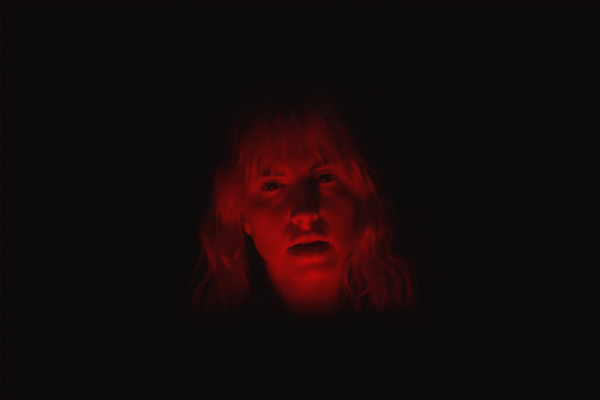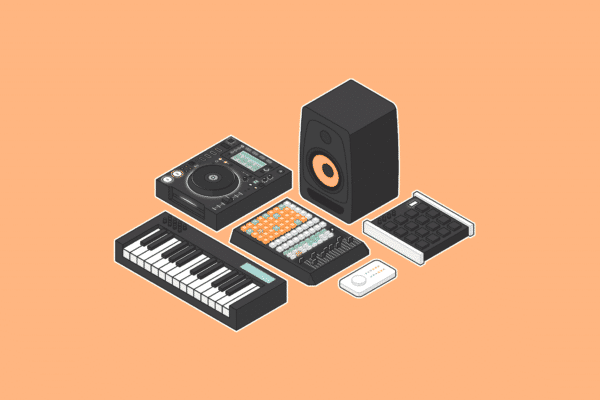FEATURE:
A (VERY) BASIC GUIDE TO BECOME A PC MUSIC STAN
How can something so obviously fake feel so real? An introduction to the PC Music World.

Photo: QT, via YouTube
I once was the cynical indie or die kind of music fan. The type who found themselves criticising any artist without ‘live’ instrumentation. “Synthetic” was once an insult in my young musical mind. Little did I know that this synthetic sound would be the backbone of what I now believe to be music’s most forward-thinking movement - a movement that has surpassed its underground status and is now fully present in our greater consciousness. This is PC MUSIC - a label founded by producer and performer A.G Cook.
The style of the music performed by the majority of the artists on this label has been described as experimental, avant-garde electronica with a bubblegum base. What unites them all, however, is a unique underground spirit. Form is broken, and risks are taken in the song structure, the sounds used and messages that are conveyed. Given the music’s synthetic nature, you would be surprised to know that it’s origins span back as far as the 1950’s. Conlon Nancarrow was an American composer who believed that by using a Player Piano to perform complicated rhythmic patterns at lightning speed, human capability could be outperformed by machines. This sensibility of pushing what instruments and vocals can do was taken on by Cook in his approach. Computers can take music where it naturally couldn't go before, through distorted effects and layered beats.
The label’s artists include Hannah Diamond, Felicita, EasyFun, Danny L. Harle and Umru. Collaboration is key in the PC Music camp. With producers working with various performance artists, less likely voices are heard. This brings another kind of energy to the live shows, as you really never know who’s going to appear. The artists frequently collaborate, and the label has released two inspired mixtapes. These artists initially spawned from Soundcloud and have now become their own subgenre. PC Music inspires fashion with its nods to nostalgic rave days gone-by, as well as future fashion trends to come. It is also one of music’s most inclusive movements with a lot of love for the LGBT community in particular, radiating from both fans and artists.
Brash beats and experimental choices translate into anthems, and even if upon first listen you are left thinking the music is not for you, the rhythmic patterns get stuck in your head. This was certainly the case with me and my introduction to this style of music, the SOPHIE produced ‘Vroom Vroom’ by Charli XCX.
Upon initially hearing the song “Vroom Vroom” by Charli XCX in late 2015 I thought of it as nothing more than a mockery of modern music. The simplistic lyrics and imitation car noises were something my indie elitist friends and I openly made fun of. I had been a fan of her earlier material and this shift felt like career suicide. Upon the release of her second mixtape of 2017, Pop 2, a friend of mine told me that the tape was actually “pretty decent”. As my taste had expanded and snobbery lessened by this point, I decided to give it try. And boy, I’m glad I did, as the experimental avant-garde pop would not only introduce me to Charli’s excellent discography, but to a whole roster of game-changing artists. I could now revisit Vroom Vroom and hear its forward thinking production and captivating delivery. This song well and truly goes off, and sends fans into somewhat of a demonic rampage when performed live.
The aforementioned SOPHIE is perhaps one of this generations most important artists. A true visionary, SOPHIE is a Scottish experimental DJ, producer and performer. As a trans woman, Sophie champions her largely queer fanbase all the while pushing the boundaries of electronic music. While not on the PC Music label, she frequently collaborates with artists on the roster. I found that even with the more conventional pop stars she collaborates with (like XCX), she brings out a sense of urgency, striving to push the artist to beyond the music they have produced before, sonically. The music itself has breaks, and varies from high-pitched, glitchy pop - to romping, dark, industrial noise. Upon seeing SOPHIE live last year, I overheard fans having conversations about some of her unreleased work. The tone of the conversation were as if the subject matter was famous painters. Comparing sonic tones and production styles. Like it or not, this music is art, and whether it is something you find yourself laughing at or dancing to, its already impacted you the second you listen. Indifference kills art, and I’d struggle to find anyone who is indifferent toward this sound.
Hearing PC Music through a speaker is one way to enjoy it, but its truly some next level sh*t in person. Affiliated with the LGBT community and certain substances (not necessary, but maybe complimentary for the music), the atmosphere at these often small, underground shows truly boils over into hysteria. The good kind of hysteria. I can only speak from my experience seeing SOPHIE at a festival last summer. The uncertainty of what’s to come is what really makes the show. What guest will make an appearance onstage? When will the beat drop? The show started with the simple moniker and a lot of dry ice exploded into a colourful light-show. From the electronic assault of ‘Whole New World’ to the unreleased banger ‘Burn Rubber’, the show brought together an energy that felt both nostalgic and futuristic - which is something I believe to be true of the subgenre as a whole. The sounds and production used feel like they belong in the next decade, but the energy and euphoria of the crowd is rooted somewhere in 90’s rave culture. To fully contextualise PC Music, you have to understand it as being something intentional. It is art that has been made for us to digest and reproduce within our own music taste, clothing and energy at the shows. Although they are not purely PC Music, Dylan Brady and Laura Les of 100 gecs are a group that have become infamous for their meme-able bubblegum base hilarity. The atmosphere at these shows, however, is serious. Look up any performance of “Money Machine”, and the thrashing movements of the crowd and screaming accompaniment is reminiscent of what you might see at a punk show. The same can be said for SOPHIE’s “Immaterial”, a track that is both buoyant and brash. It elicits a crowd reaction that ‘guitar bands’ would kill for - and in 2020, it’s a reaction a guitar band is quite unlikely to get.
If you’re brand new to this subgenre, I have constructed a playlist with some the sub-genre’s greatest hitters to get you started. I also advise that you look up any performance of a PC Music show live to get hyped on the wild, exhibitionist energy exuded by both the crowd and artist alike. The music has been thought of as solely a parody, including (initially) from this writer, but once you stop laughing, you realise you might be listening to a little piece of the future.
The style of the music performed by the majority of the artists on this label has been described as experimental, avant-garde electronica with a bubblegum base. What unites them all, however, is a unique underground spirit. Form is broken, and risks are taken in the song structure, the sounds used and messages that are conveyed. Given the music’s synthetic nature, you would be surprised to know that it’s origins span back as far as the 1950’s. Conlon Nancarrow was an American composer who believed that by using a Player Piano to perform complicated rhythmic patterns at lightning speed, human capability could be outperformed by machines. This sensibility of pushing what instruments and vocals can do was taken on by Cook in his approach. Computers can take music where it naturally couldn't go before, through distorted effects and layered beats.
The label’s artists include Hannah Diamond, Felicita, EasyFun, Danny L. Harle and Umru. Collaboration is key in the PC Music camp. With producers working with various performance artists, less likely voices are heard. This brings another kind of energy to the live shows, as you really never know who’s going to appear. The artists frequently collaborate, and the label has released two inspired mixtapes. These artists initially spawned from Soundcloud and have now become their own subgenre. PC Music inspires fashion with its nods to nostalgic rave days gone-by, as well as future fashion trends to come. It is also one of music’s most inclusive movements with a lot of love for the LGBT community in particular, radiating from both fans and artists.
Brash beats and experimental choices translate into anthems, and even if upon first listen you are left thinking the music is not for you, the rhythmic patterns get stuck in your head. This was certainly the case with me and my introduction to this style of music, the SOPHIE produced ‘Vroom Vroom’ by Charli XCX.
Upon initially hearing the song “Vroom Vroom” by Charli XCX in late 2015 I thought of it as nothing more than a mockery of modern music. The simplistic lyrics and imitation car noises were something my indie elitist friends and I openly made fun of. I had been a fan of her earlier material and this shift felt like career suicide. Upon the release of her second mixtape of 2017, Pop 2, a friend of mine told me that the tape was actually “pretty decent”. As my taste had expanded and snobbery lessened by this point, I decided to give it try. And boy, I’m glad I did, as the experimental avant-garde pop would not only introduce me to Charli’s excellent discography, but to a whole roster of game-changing artists. I could now revisit Vroom Vroom and hear its forward thinking production and captivating delivery. This song well and truly goes off, and sends fans into somewhat of a demonic rampage when performed live.

Photo: Charli XCX, courtesy of Bradley and Pablo
The aforementioned SOPHIE is perhaps one of this generations most important artists. A true visionary, SOPHIE is a Scottish experimental DJ, producer and performer. As a trans woman, Sophie champions her largely queer fanbase all the while pushing the boundaries of electronic music. While not on the PC Music label, she frequently collaborates with artists on the roster. I found that even with the more conventional pop stars she collaborates with (like XCX), she brings out a sense of urgency, striving to push the artist to beyond the music they have produced before, sonically. The music itself has breaks, and varies from high-pitched, glitchy pop - to romping, dark, industrial noise. Upon seeing SOPHIE live last year, I overheard fans having conversations about some of her unreleased work. The tone of the conversation were as if the subject matter was famous painters. Comparing sonic tones and production styles. Like it or not, this music is art, and whether it is something you find yourself laughing at or dancing to, its already impacted you the second you listen. Indifference kills art, and I’d struggle to find anyone who is indifferent toward this sound.
Hearing PC Music through a speaker is one way to enjoy it, but its truly some next level sh*t in person. Affiliated with the LGBT community and certain substances (not necessary, but maybe complimentary for the music), the atmosphere at these often small, underground shows truly boils over into hysteria. The good kind of hysteria. I can only speak from my experience seeing SOPHIE at a festival last summer. The uncertainty of what’s to come is what really makes the show. What guest will make an appearance onstage? When will the beat drop? The show started with the simple moniker and a lot of dry ice exploded into a colourful light-show. From the electronic assault of ‘Whole New World’ to the unreleased banger ‘Burn Rubber’, the show brought together an energy that felt both nostalgic and futuristic - which is something I believe to be true of the subgenre as a whole. The sounds and production used feel like they belong in the next decade, but the energy and euphoria of the crowd is rooted somewhere in 90’s rave culture. To fully contextualise PC Music, you have to understand it as being something intentional. It is art that has been made for us to digest and reproduce within our own music taste, clothing and energy at the shows. Although they are not purely PC Music, Dylan Brady and Laura Les of 100 gecs are a group that have become infamous for their meme-able bubblegum base hilarity. The atmosphere at these shows, however, is serious. Look up any performance of “Money Machine”, and the thrashing movements of the crowd and screaming accompaniment is reminiscent of what you might see at a punk show. The same can be said for SOPHIE’s “Immaterial”, a track that is both buoyant and brash. It elicits a crowd reaction that ‘guitar bands’ would kill for - and in 2020, it’s a reaction a guitar band is quite unlikely to get.
If you’re brand new to this subgenre, I have constructed a playlist with some the sub-genre’s greatest hitters to get you started. I also advise that you look up any performance of a PC Music show live to get hyped on the wild, exhibitionist energy exuded by both the crowd and artist alike. The music has been thought of as solely a parody, including (initially) from this writer, but once you stop laughing, you realise you might be listening to a little piece of the future.
PC MUSIC PLAYLIST:
MORE:



